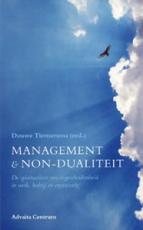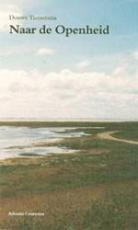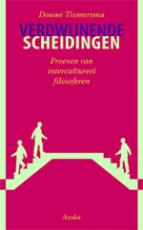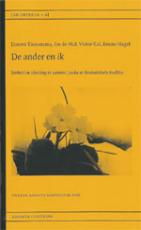Advaita Post #12-07 - As the experienced separation with the deceased disappears...
Volume 12 No. 7 (May 15, 2011)
--- As the experienced separation with the deceased disappears, there is no duality and no suffering any more. ---
"The man who measures the clouds"
(Jan Fabre - Kröller-Müller Museum)
- But there are no clouds!
*
People vainly search for rest
in what is limited and transitory.
They don't find peace anywhere
except where they consciously rediscover themselves
free from conditions,
free from themselves.
*
*
Dying and mourning - the non-dualistic perspective (Part 3)
Re-working of the talk given at the Zuylen Funeral Home, Breda, January 18, 2009
The loss of someone who was dear to you
There is a great opportunity to recognize non-duality not only as you face your own death, but also as someone close to you dies. The physical body falls away, but has the other now completely disappeared? No. Many people have the experience that the other is even closer than during his or her lifetime.
When you see the other from a physical point of view: I'm here and the other there, that is duality. Can you see that you have constructed the other this way? Of course you also experience something else, especially if it is someone you love. When you say "I love you", where are you focused? Not just on the physical body. There is a great depth in that "you" of the one you love. The self-being of the other is infinite and I am focused on that. To the extent that you experience this depth, it is a being-experience of inseparability, of non-duality. So you see that the infinite non-duality is present everywhere in daily life. You only have to recognize it and also positively affirm it.
As long as there is a dualistic structure, you easily shield yourself from the strong proximity and non-duality within everyday life, so long as the physical object-body of the other remains present. When at death the physical aspect of the other fades, the underlying layer of closeness and unity comes more into the light. Namely, you are no longer so distracted by the physical. Precisely as the physical falls away, there appears to be an open dimension in which the non-duality manifests itself. Then it is clear that this non-duality was always there. Augustine said that a friend whom you don't see often, still gives you an experience of closeness and joy. However difficult the death of another is, this recognition of unity is experienced as positive by all. For the survivors who mourn, this experience of quiet unity dissolves much heaviness.
He who knows nothing of dying, knows nothing of living
That's the motto of this lecture series: you know little about living, if you don't know about dying. I have spoken about it in that sense: precisely through letting go of your own personally significant forms, qualities, ideas about death, life comes free in its great depth. This letting go means a return to the source that you are, through which there comes an openness for everything and everyone. This breaking open in consciousness and love thus means a liberation in life. There is the realization of inner unity and this unity is the larger context in which life goes on. Thus there is also the liberation of life itself. Then there are no separations any longer, despite the great diversity that is there. This diversity is included within the great non-duality. So it's good to know something about death. Only then does it seem that life is able to manifest in all its fullness and richness, without boundaries.
Just at the end of life there is thus an incredibly great opportunity to release everything. Precisely because then it's so acute. It's all or nothing. If you still choose to hold on, it's immediately clear that such a choice is full of suffering. That's also true within life, but then the contrast is not often so clear. The chance to realize non-duality is great precisely when you are face to face with death, to say goodbye to the limited self and to see that the self is not tied to limited forms and names. Leaving this confrontational dimension open during life is an important meditative practice.
Mourning and guidance for the bereaved
There is mourning when you have lost a piece of your own identity, of your own existence. This applies to a part of your body, when it has been amputated. It also applies equally to someone who has died and was a part of your identity. The mourning stops when a new identity arises without the lost part. There is much that can be said on the level of the person who finds this difficult, but here it's about letting go of the whole personal identity and the recognition of the all-inclusive space in which the limitations of identity and separation of self and other exists. That release and this recognition is possible and together they indicate a liberation from the suffering that exists within mourning.
How should you best guide the bereaved? That should be clear by now: by remaining yourself, in the infinite openness. Then nothing more needs to happen, even though there is still something that may be said. That openness is infinite silence. Those who grieve rise above their own sad feelings, because also with him or her the being-experience of openness breaks through. The experienced separation with the deceased and the 'guide' disappears. Then there is no duality and no suffering any more.
Er is geen tweeheid
als je ontspannen bent
in zelf-bewustzijn
is dat duidelijk.
Boeken
Douwe schreef en redigeerde gedurende zijn leven boeken. Via onze uitgeverij zijn deze nog verkrijgbaar.



